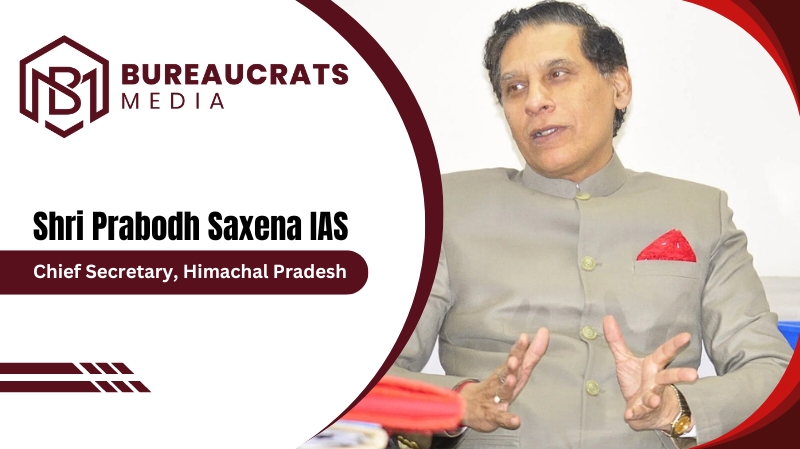Shri Prabodh Saxena is a distinguished officer of the Indian Administrative Service (IAS), belonging to the Himachal Pradesh cadre, having commenced his journey in 1990 through direct recruitment. With over three decades of service, he has held a range of significant positions across the central and state government, making noteworthy contributions in various domains including finance, governance, and international diplomacy.
After joining the IAS, Shri Saxena’s career took off in Himachal Pradesh, where he served in a range of key district-level positions. His early assignments saw him take on the role of Sub-Divisional Officer (SDO) in Bilaspur, followed by positions as Additional Deputy Commissioner and Settlement Officer in Kangra. This phase of his career, between 1993 and 1997, was marked by significant involvement in land revenue management and district administration, offering him vital grassroots-level experience in governance.
In 1998, he transitioned to the role of Deputy Commissioner of Mandi, where he remained until 2003. During this time, he demonstrated exceptional leadership in managing district affairs, which would lay the foundation for his future roles in higher levels of administration.
Shri Saxena’s capabilities saw him ascend to more complex roles. By 2004, he had moved to positions with broader scope, including Director and Secretary-level roles in departments such as Home and Vigilance, Personnel, and General Administration. His responsibilities in these roles included overseeing critical state functions like legal affairs, law enforcement, and vigilance operations. Between 2006 and 2008, he served as the Director of the Vigilance Department, further honing his skills in administrative oversight and governance.
During this period, his involvement in financial management became more prominent as he transitioned to the finance sector, marking the beginning of a long-standing association with budget control, financial planning, and economic affairs.
One of the significant milestones in Shri Saxena’s career was his tenure at the Central Government. Between 2008 and 2013, he held pivotal roles within the Ministry of Finance, particularly in the Department of Economic Affairs. He served as Director and later Joint Secretary, playing a key role in shaping India’s financial and economic policies. His expertise in finance was recognized through his appointments, which included strategic positions related to financial services and economic planning.
From 2013 to 2016, Shri Saxena was posted as Senior Advisor to the Executive Director at the Asian Development Bank (ADB) in Manila. This foreign posting provided him with a global perspective on financial innovation and economic diplomacy, which proved valuable in his subsequent roles. His work at ADB was recognized for its impact, particularly in the area of tripling lending resources without additional financial investment—a testament to his innovative financial strategies.
Upon returning from his international assignment, Shri Saxena resumed his service in Himachal Pradesh, taking on some of the most senior positions in the state administration. His return marked a period of substantial contributions in the areas of finance, planning, and governance. Between 2016 and 2022, he served as Principal Secretary and later as Chief Secretary to the Government of Himachal Pradesh.
During this period, he held several key portfolios, including Health and Family Welfare, Finance, Planning, Housing, Urban Development, and Power. His broad range of responsibilities showcased his versatility and deep understanding of various sectors, particularly his expertise in financial management, where he played a critical role in ensuring budgetary discipline and financial planning for the state.
His appointment as the Chief Secretary to the Government of Himachal Pradesh in December 2022 stands as a culmination of his long and illustrious career in the civil service. As the highest-ranking bureaucrat in the state, Shri Saxena now oversees the administration’s functioning, guiding policy decisions and ensuring effective governance across multiple sectors.
Shri Saxena’s academic credentials are equally impressive. He holds an LL.M. from the London School of Economics (LSE), where he excelled with outstanding performance. He also has postgraduate qualifications in Economics and a law degree (LL.B.), which provided him with a strong foundation in both economic and legal matters—two fields that would define much of his administrative career.
In addition to his formal education, Shri Saxena has undergone multiple specialized training programs, both domestically and internationally. Notable among these is the Executive Development Program in the USA, and specialized training on Environmental Impact Assessment in Japan. His training has allowed him to stay at the forefront of administrative practices and adapt global best practices to the Indian context.
Shri Saxena is also an accomplished author, having published several articles and papers on topics ranging from economic diplomacy to the Right to Information (RTI). His works, including publications in The Administrator and Economic & Political Weekly, reflect his deep insights into governance, human rights, and financial management.
Shri Prabodh Saxena’s career is a testament to his commitment to public service and his ability to navigate the complexities of governance across multiple domains. His journey from district-level administration to the highest bureaucratic office in Himachal Pradesh demonstrates his capacity for leadership, adaptability, and innovative thinking.
With his vast experience in both state and central government, as well as international financial institutions, Shri Saxena’s expertise continues to shape the policies and governance framework in Himachal Pradesh. His role as Chief Secretary puts him at the helm of the state’s administration, where his decisions will have a lasting impact on its development trajectory.
Shri Saxena’s illustrious career stands as an example of the dedication, skill, and strategic foresight required to succeed in the Indian Administrative Service. His contributions to governance, particularly in finance and economic planning, have left an indelible mark on the institutions he has served, and his leadership in the coming years will undoubtedly continue to steer the state towards greater prosperity and good governance.




